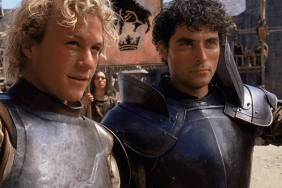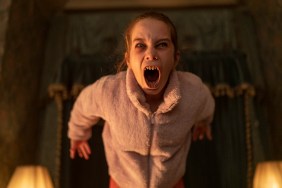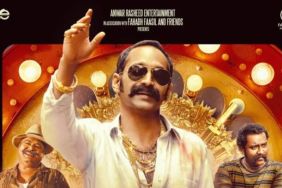
Lars von Trier was bored and depressed and so he decided to make a movie. I’m not saying this based on fact, but that’s the impression I got after watching and digesting Melancholia, an apocalyptic companion piece to Terrence Malick’s The Tree of Life, which played only two days earlier here in Cannes.
I imagine von Trier searching for an idea and coming upon an apocalyptic vision, the end of the world at the hands of a planet that’s been hiding behind the sun and is ten times the size of Earth. Once the planet arrives, it crushes the blue marble we call home. Such a notion caused the depressed writer/director to wonder, What would I make of the end of the world? Would I care? Again, I don’t know if he asked himself these questions, but it’s the impression I got. And with these questions in mind he began writing.
The only place to begin would seemingly be an instance of absolute human happiness. A wedding, or a wedding reception to be specific. But, despite the fact this reception is being held at a lavish hillside castle surrounded by an 18-hole golf course, things aren’t all smiles. Perhaps as an accident or simply in an effort to confuse his detractors, the director, whom is often referred to as a misogynist, injects his voice into the film, not as the groom (Alexander Skarsgaard), but as Justine (Kirsten Dunst), the bride.
Following a Wagner fueled operatic opening eight minutes, foreshadowing Earth’s demise in elegant slow motion, the title appears and we find our happy newlyweds on their way to their reception put together by Justine’s sister Claire (Charlotte Gainsbourg) and her husband John (Kiefer Sutherland). As the night wears on, Justine becomes detached from not only the wedding party but also her new husband. The catalyst appears to be her parents (Charlotte Rampling and John Hurt), both of which, instead of toasting to the bride and groom, take the opportunity to lay into one another. Justine’s mother tips the scales, sneering as she tells the newlyweds, “Enjoy it while it lasts.”
Where smiles once could be seen on Justine’s face, a blank stare now resides and will reside for the duration of the film. Her marriage is crushed only hours after saying “I do.” Her depression and detachment collides with her sister’s worry and concern as the giant planet Melancholia hangs on the horizon, threatening to destroy everything. “The Earth is evil, we don’t need to grieve for it,” Justine says as Claire looks on, incredulous.
Von Trier describes Melancholia as a “beautiful film about the end of the world,” which is to say he believes he’s found beauty in absolute sadness. On a completely superficial side he’s right, his film is beautiful. You could also find support for this idea in Dunst’s character and what appears to be von Trier’s acceptance of the naivete of the rest of the world that surrounds him, compassion for the innocent and even a delicate, though pitiful, burial for those too afraid to face reality.
However, as poetic as that may sound, the film doesn’t offer very much. Melancholia seems to simply come from a place of boredom and von Trier’s interest in making a film because he had nothing better to do. He wrote his last film, Antichrist, while he was bedridden with depression and it would seem he’s still holding on to some of that. While this film won’t be as controversial as Antichrist, he still tries to jab briefly at the audience, prodding us into wondering why Justine would leave her party to urinate on the golf course while in her wedding dress or why she has sex with a stranger (Brady Corbet) in a sand trap. As far as those two examples are concerned, I really couldn’t care less.
Sure, von Trier is right, he made what is unquestionably a beautiful film, shot by Manuel Alberto Claro. It’s also a film about the end of the world so that too is on point. The amount of nudity required of Kirsten Dunst signals a brave, “I’m a serious actor” performance, but in terms of acting she’s only required to sulk around set for the film’s 130-minute duration. And no I’m not saying she’s bad, in fact she’s quite good, I’m just telling you how it is. Along with Dunst, Gainsbourg and Sutherland are also quite good and I particularly enjoyed the brief moments of levity brought by Udo Kier and Jesper Christensen.
Melancholia isn’t a bad film, it’s simply a film that takes much inspiration from its title. It’s a melancholy, sad sack kind of feature and what I perceived to be von Trier’s boredom with it hit me quite hard. If he had been able to break free of his own sadness perhaps there could have been some real lifeblood to counter Justine’s dour mood, but even Sutherland’s optimism isn’t enough to make this more than a one note meandering feature.










